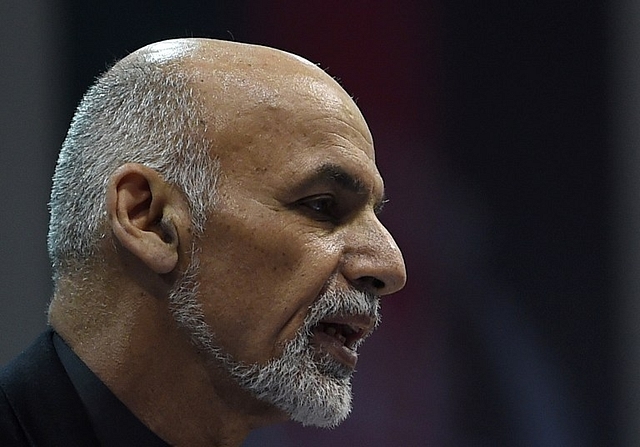
How Much Longer Will Ghani Trust Pakistan?
The Afghan president has invested immense political capital in his outreach to Pakistan. But, he has only setbacks to show for it. How long before Ashraf Ghani loses patience with Pakistan?
When the new Afghan president, Mohammad Ashraf Ghani, courageously attempted a rapprochement with Pakistan almost a year ago, there was a sense of cautious optimism in the region. In an effort to bring an end to Pakistan’s decades long ‘undeclared war’ on Afghanistan, he spoke of joint efforts to combat terrorism and enhanced bilateral cooperation for regional stability, economic prosperity and trade.
The cold-blooded attack on APS in Peshawar (Pakistan’s Pashtun periphery) on 16 December 2014 saw Pakistan pledge a much-touted ‘paradigm shift’ in its Taliban related anti-terror policy. People and political pundits within the country spoke of Pakistan’s military establishment abandoning, once and for all, its decades-long use of terrorism as a tool of foreign policy. The security institutions in Pakistan publicly announced a ‘change of heart’ by initiating a National Action Plan (NAP). There was to be no ‘Good Taliban’ and ‘Bad Taliban’. All this talk was the main theme of Pakistani security officials’ charm offensive to the West and Afghanistan during its last ‘winter diplomacy’.
Ever since the inauguration of the National Unity Government in September last year, a rapprochement with Pakistan had been the top priority for the Afghan President. Seeking Pakistan’s support in bringing an end to the decades-long conflict by pushing the Taliban to initiate peace negotiations, President Mohammad Ashraf Ghani invested immense political capital in the initiative and hoped for reciprocity from Pakistan. In so doing, the Afghan President made concessions to Pakistan that were long considered taboo in Afghan politics and public opinion and which lead to heavy criticism and isolated the NUG at home.
The most controversial aspect of this outreach was an Memorandum of Understanding (MoU) signed between the National Directorate of Security (NDS) and the Inter Service Intelligence (ISI) which allowed the latter to further deepen its already considerable footprint in Afghanistan. Besides, Afghanistan’s long-standing relationship with India was also downgraded to appease Pakistan.
But when the Taliban launched their ‘spring offensive’ with renewed ferocity, the Afghan President was unable to show tangible gains for his outreach and concessions to Pakistan. Short of options, he opted for a ‘strategic silence’ until a series of high profile bombings rocked the Afghan capital Kabul. This proved to be the last straw and the President made a public and stern denouncement of Pakistan on August 8th. A high level delegation which included Foreign Minister Salahuddin Rabbani, the acting Defense Minister Masoom Stanikzai and head of the National Directorate of Security (NDS) travelled to Islamabad to seek answers. But they were met with the customary mix of denials and false promises. On return, the Defense Minister, Masoom Stanikzai, spoke of Pakistan waging a ‘declared war’ on Afghanistan.
Notwithstanding the Afghan government’s numerous concessions, little seems to have changed in Pakistan’s strategic calculus vis-à-vis Afghanistan. Despite assurances of a policy shift in regard to Taliban, the Pakistani officials have regularly refuted their commitment. Ashraf Ghani has been pursuing patient diplomacy for months on end, even in face of continued Pakistani intransigence and lack of any concrete action on part of Pakistan against terrorists. The fall of Kunduz is perhaps the best indication of Pakistan’s intentions.
For all its talk of a ‘paradigm shift’ following the Peshawar massacre, the Pakistan establishment’s long standing policy of using terror groups as a foreign policy tool for influence in the region, especially Afghanistan, continues unabated. Despite public claims to the contrary, the classification of terror groups into ‘good’ (those under Pakistan’s influence and which pose no threat to it) and ‘bad’ (those which seemed to have turned against their erstwhile backers) continues.
By all indications, the Taliban continue to enjoy logistical, financial and military support from Pakistan. The spectre of Afghan Taliban holding huge open congregations in major Pakistani cities and declaring war on Afghanistan should convince even the most optimistic of analysts of the illusory nature of the much-hyped ‘paradigm shift’. The mysterious death of the Taliban supremo Mullah Mohammad Omar and the handpicked successor of Mullah Mohammad Omar , Mullah Akhtar Mohammad Mansoor, provided an opportunity for Pakistan to elevate to the fore those who are completely subservient to its dictate.
Moreover, Pakistan succeeded quickly to marginalize the once relatively independent Qatar Political Office of the Taliban led by Tayyeb Agha. So, it can safely be said that Pakistan has successfully managed to retain a virtual veto over access to the Taliban leadership based in Pakistan and thus the agenda and outcome of any future peace negotiations between the Afghan Taliban and the Afghan government.
Additionally, the rise of ISIS in the region seems to have granted the Pakistani establishment another card to play in both the peace negotiations and actual events and happenings on the ground and the battlefield. This could be a threat to the whole region and the wider world.
The admirable and costly effort at a rapprochement with Pakistan by Ashraf Ghani did not receive the recognition and support that it ought to have. Meanwhile Pakistan’s twin tracks of supporting the Afghan Taliban in its bloody insurgency in destabilizing Afghanistan and public utterances about peace in Afghanistan seem to have no end in sight. Therefore, a Pakistan-initiated revision in this policy, and hence a positive Pakistani contribution to peace in Afghanistan and Pashtun peripheries in Pakistan, remains elusive.
In the meantime Mohammad Ashraf Ghani’s maneuvering space in response to the continued hostility and wanton disregard of Afghanistan’s sovereignty emanating from Pakistani territory remains severely limited, primarily due to the of lack of meaningful diplomatic support by the international community, especially the US and regional players. Therefore it is time for India to step up its diplomatic and military support for Afghanistan and fill in the vacuum created by withdrawal of international community.